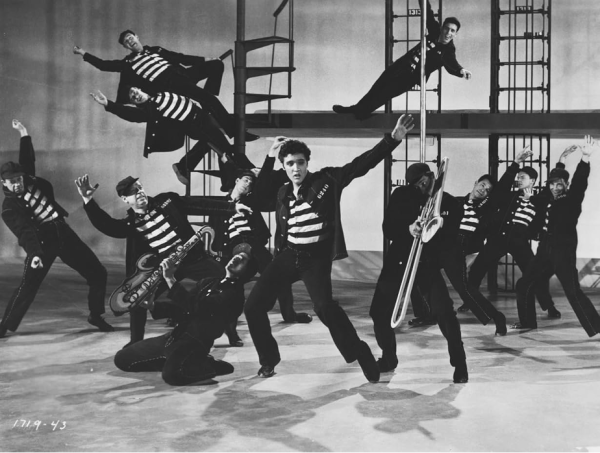Wednesday, Jan. 8 marks the 90th birth anniversary of the late Elvis Presley. Known for his winning vocals and spinning dance moves, “The King of Rock ‘n’ Roll” became a musical icon in the 1950s, ‘60s and beyond, with many of his hits like “Jailhouse Rock,” “Suspicious Minds” and “Can’t Help Falling In Love” still recognized today. Several contemporary artists, from Bruce Springsteen and Elton John to Dolly Parton and Michael Bublé, have cited Presley as a creative influence.
Although Presley has left an indelible impact on the music scene during and beyond his time, it must also be acknowledged that Presley himself was influenced by the music that came before him, most of all Black music and dance. As many continue to remember his role as a pioneering artist 90 years after his birth, as critical listeners, it remains key to give credit to the sources that inspired Presley.

Alannah Myles opens her 1990 song “Black Velvet,” a tribute to Presley, by crooning: “Mississippi in the middle of a dry spell / Jimmy Rodgers on the Victrola up high.”
That’s where Elvis Aaron Presley’s life began, in Tupelo, Miss. on Jan. 8, 1935; he and his family moved to Tennessee in 1948. He was influenced by the likes of singer-guitarist B.B. King and pianist Fats Domino; he was also inspired by “the gospel music he heard in church and at the all-night gospel sings he frequently attended, and the Black R&B he absorbed on historic Beale Street as a Memphis teenager,” his Graceland biography reads. “Colonel” Tom Parker served as Presley’s manager until his death, and has often been credited with boosting his career.
Presley served in the U.S. Army from 1958 until 1960, and was considered a symbol of patriotism in the face of the Cold War. While stationed in Germany in 1959, he met American Priscilla Beaulieu. Aged just 14 at the time, she was in Germany with her military adoptive father. Elvis soon started a relationship with Priscilla, and the couple married in 1967; nine months later, they had their only child, daughter Lisa Marie, who herself became a singer. They were divorced in 1972.
For years, Presley was perhaps the quintessential American musician. He performed many high-selling concerts, from “Aloha From Hawaii” in 1973, which was broadcast via satellite, to his 1975 New Year’s Eve concert held at Pontiac Silverdome in Detroit, where 60,000 attendees congregated to celebrate the incoming 1976. His discography remained successful even after he returned from the Army, with early songs such as “Hound Dog” (a cover of the single by Big Mama Thornton) being just as recognizable as his later songs. He also gained some prominence as an actor, starring in films including “Love Me Tender” (1956) and “Blue Hawaii” (1961). Not all his films were necessarily successful, and even Presley himself became disillusioned with them.
Drug use and unhealthy eating habits took their toll, and on Aug. 16, 1977, he died suddenly from heart disease in Memphis, Tenn. He was 42 years old; the global music scene was left with a void.
Several of Presley’s family members have followed his path into show business. Lisa Marie’s debut album, “To Whom It May Concern” (2003), peaked at No. 5 on the Billboard 200 chart; she died in 2023, aged just 54. Lisa Marie’s daughter Riley Keough has established herself as an actress, starring in roles including as the protagonist of limited series “Daisy Jones & The Six” (2023).
Presley’s legacy has also been explored through popular culture. The 2022 biopic “Elvis” was directed by Baz Luhrmann and starred Austin Butler as Presley. The following year, Sofia Coppola’s film “Priscilla,” a biopic of Priscilla Presley, starred Cailee Spaeny in the lead role and Jacob Elordi as Presley. In the 1980s sitcom “Full House,” main character Jesse Katsopolis was depicted as a superfan of Presley; not only was Jesse’s actor, John Stamos, also a fan of the musician, but the name of Jesse had been selected as a tribute to Presley’s twin brother, who died at birth. And Myles’ song expertly encapsulates the sheer influence that Presley had on the music scene, describing his performing flair and way with the crowds as “A new religion that’ll bring ya to your knees.”
But was Elvis Presley the only man behind his music?
90 years after his birth, Presley continues to be hailed as a musical titan. His many fan clubs from around the world range from his hometown in Tupelo to the United Kingdom. He received several Grammy nominations over the 1960s and 1970s, and won the Award for Best Inspirational Performance – a now-defunct category for religious songs – in 1972 and 1974, for the songs “He Touched Me” and “How Great Thou Art” respectively. According to the Guinness Book of World Records, Presley also received 299 certifications – more than any other musician – from the Recording Industry Association of America, all gold, platinum or multi-platinum. His most-certified single was the double-sided “Hound Dog/Don’t Be Cruel.”
But can all of these accolades be attributed to the man himself? Presley’s music comprises numerous influences from the Black American music scene, including but not limited to covers of songs by Black artists.
Let us begin with “Hound Dog,” Presley’s most certified single. Written by Mike Stoller and Jerry Lieber, it was recorded for the first time in 1952 by Willie Mae Thornton, known on stage as Big Mama Thornton. The song was commercially successful, remaining at No. 1 on the Billboard R&B chart for a number of months, but Thornton was only paid $500 for the recording. American Songwriter describes Thornton’s recording as being “about an angry woman’s rejection of a philandering man who had been using her,” also highlighting how that version was written in the space of just 15 minutes.
Then, in 1956, Presley released his version of the song, which in turn was based on a more lighthearted cover by Freddie Bell and the Bellboys. It had very different lyrics and an entirely different meaning, where it was ostensibly aimed towards an actual dog. Within two years of its release, over three million records of Presley’s version had been sold, and it was only the third single to reach that milestone. Presley became a household name – such was his success that “Forrest Gump” (1994) included a scene where the titular character danced for Presley and inspired his dance moves, which he later saw as Presley performed “Hound Dog” live on television.
While Elvis enjoyed the fruits of his cover’s success, Thornton’s career and musical efforts went largely unnoticed. Presley was posthumously inducted into the Rock & Roll Hall of Fame in 1986, and his version of “Hound Dog” was also inducted two years later. Songwriters Mike Stoller and Jerry Lieber were inducted in 1987, equidistant to Presley and his recording.
Thornton? Her induction did not occur until 2024, 72 years after her recording was released, and a full 40 years after her death.
“Hound Dog” is not the only song by a Black artist that Presley has covered. “Don’t Be Cruel,” which was featured as the B-side of Presley’s version of “Hound Dog,” was first written and recorded as a demo by Otis Blackwell, a songwriter whose music had also been used by several other artists. Upon hearing Blackwell’s demo, Presley decided to record his own version of the song. Much like “Hound Dog,” Presley’s version of “Don’t Be Cruel” turned out to be a major commercial success.
American Songwriter describes the song as “a song with blues elements but a country feel-fashioned perfectly for a softer approach,” which is what apparently made it so easy for Presley to record. Blackwell remained relatively unknown in the music world – in fact, he had never met Presley personally – but a 1984 appearance on “Late Night With David Letterman” brought him prominence, where he performed “Don’t Be Cruel” for a live audience. Blackwell lived to be inducted into the Songwriters Hall of Fame in 1991; he died in 2002 and was posthumously inducted into the Rock & Roll Hall of Fame eight years later.
The question of whether Presley culturally appropriated his music or not remains a pertinent one. In 2022, Kaleem Aftab of BBC Culture reflected on the release of the “Elvis” biopic and examined both sides of that argument, which had been touched upon in the film. Those who defended Presley’s utilization of Black music stated that his covers of songs and fusion of influences brought awareness to the Black music scene.
Aftab did not deny, however, that Presley’s musical practices had their detractors. One of those detractors was Helen Kalowole, who wrote in 2002 to The Guardian that Presley’s reliance on Black artists and their music embodied the 1950s music industry’s exploitative nature. Kalowole argued that “… black music never stays underground. White people always seek it out, dilute it and eventually claim it as their own.”
Both Aftab and Kalowole have mentioned the book “Race, Rock and Elvis,” written by Michael T. Bertrand, a history professor at Tennessee State University. As stated by Aftab, Bertrand defended Presley’s use of Black music, claiming that it “helped white southerners rethink their attitude to race, leading to an unacknowledged […] impetus for white people to support the civil rights movement.”
But it’s now 2025. Mindsets have shifted and will continue to shift. The idea of a white man being lauded for raising awareness to Black artists whilst still profiting from covering their songs and infusing elements of their music is questionable, as is the idea that Black artists have to rely solely on white ones to bring them success.
Yes, Presley was friends with renowned Black artists such as Little Richard, who is hailed today as “The Architect of Rock ‘n’ Roll.” Little Richard praised Presley, but he also opined that being a white man in the 1950s was a factor that helped him achieve his meteoric success. He is quoted as saying, “I think that Elvis was more acceptable being white in that period. I believe that if Elvis had been Black, he wouldn’t have been as big as he was. If I was white … I’d be able to sit on top of the White House.”
Blues pianist Fats Domino was another musician who influenced Presley. They performed together in 1969, upon their first meeting. When Presley was addressed by the press, true to form, as “The King of Rock ‘n’ Roll,” he pointed to Domino and insisted that he was “the real King.” Presley utilized the blues genre – the genre that Domino specialized in – a great deal in his music; he also covered Domino’s hit song “Blueberry Hill” in 1957. When Domino died in 2017, sources noted that Presley himself had spoken of Domino’s contributions to the rock ‘n’ roll genre: “A lot of people seem to think I started this business. But rock ‘n’ roll was here a long time before I came along … Let’s face it: I can’t sing it like Fats Domino can. I know that.”
Many argue that Presley was an appropriator, a man who profited from Black artists and let them remain obscure while he reaped the benefits of their music. Others might maintain that Presley used his position as a white person to raise awareness of the Black community, and that he used his Black influences with good intentions. Regardless of what his intentions were, we know for sure that using influences from the Black music scene of the 1950s and 1960s — from covering songs to using Black musical elements in his original songs — helped Elvis Presley achieve his meteoric success and go down as one of rock ‘n’ roll’s most iconic faces. Simply put, to properly acknowledge Elvis Presley is to properly acknowledge the Black musical sources that went into his sheer superstardom; to give the musicians such as Big Mama Thornton, Otis Blackwell and Fats Domino their due credit for their songwriting and their musicianship.
Legacy
One cannot deny that Presley had a smooth voice and a charm that endeared him to audiences worldwide, during and beyond his time. Naturally, his 90th birth anniversary will be a noteworthy date for many music enthusiasts. Between Wednesday, Jan. 8 and Saturday, Jan. 11, celebrations will be hosted at Graceland, Presley’s residence, for the occasion.
We must remember the Black artists who Presley emulated and in some cases took from. Big Mama Thornton’s induction into the Rock & Roll Hall of Fame, long overdue as it might have been, could be considered a step towards making people aware that Presley wasn’t the only man behind his music. So, as you listen to Presley, listen to Big Mama Thornton’s recording of “Hound Dog.” Listen to Otis Blackwell’s recording of “Don’t Be Cruel.” Listen to Fats Domino’s recording of “Blueberry Hill,” and you won’t be able to deny that Presley owes a great deal of gratitude to these artists.
Kalana Amarasekara can be reached at [email protected].

















